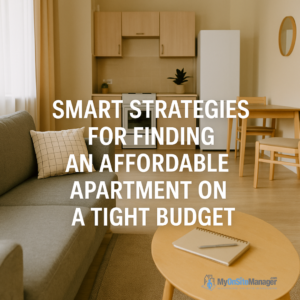Finding an affordable place to live in 2025 is no small feat. As rents continue rising and vacancies remain tight in many cities, renters across the U.S. are being forced to rethink how they search for housing. Whether you’re moving for a new job, downsizing, or just looking to reduce costs, here’s a practical, step-by-step approach to finding a rental without overextending your wallet.
Step 1: Know Your Budget — And Be Realistic
Before you even look at listings, sit down and calculate what you can truly afford.
-
Use the 30% Rule: Most financial experts recommend spending no more than 30% of your gross monthly income on rent. For example, if you earn $4,000/month, your max rent budget should be around $1,200.
-
Factor in All Living Costs: That 30% doesn’t account for other necessities like utilities, internet, transportation, groceries, or medical expenses. Use a budgeting app like YNAB (You Need a Budget) or Mint to get a clear picture.
-
Be Honest About Lifestyle Spending: If you’re regularly using DoorDash, Uber, or streaming services, those recurring expenses cut into your housing budget. Making a few temporary lifestyle cuts could expand your housing options.
Pro Tip: Check if you qualify for government housing assistance programs like Section 8, but keep in mind that waiting lists are long in many areas.
Step 2: Expand Your Search Radius
Your ideal neighborhood might be out of reach—and that’s okay.
-
Widen Your Net: Look at nearby suburbs, older neighborhoods, or areas just outside the urban core. These spots often have significantly lower rents with similar access to amenities.
-
Older Properties Can Mean More Value: While newer luxury apartments boast modern finishes, older buildings often offer more square footage at a lower price. Think hardwood floors and built-in storage instead of stainless steel and smart locks.
-
Converted Units or Duplexes: A unit in a converted home or a duplex might lack some frills but can be a steal in the right neighborhood.
Real Talk: The closer you stay to public transit, grocery stores, or work, the more valuable a property is—but that comes at a cost. If you’re remote or flexible, you may be able to trade location for price.
Step 3: Time Your Move Strategically
Rental markets ebb and flow—and timing can help you save.
-
Winter = Leverage: In colder cities like Minneapolis or Chicago, fewer people move in the winter. This off-peak demand means landlords may offer discounts, waived fees, or more flexible terms to fill vacancies.
-
Avoid Peak Months: Summer is notoriously competitive. If possible, plan your move for the late fall or early winter when there’s less competition.
Tip: If your lease ends in the summer, try negotiating a short-term extension to delay your move until the market cools.
Step 4: Do Your Homework on Landlords
An affordable apartment is only a good deal if it’s managed by someone trustworthy.
-
Use Review Sites like Shuk: New tools like Shuk let renters anonymously share experiences about landlords and management companies.
-
Ask Questions: When touring units, ask how maintenance requests are handled, how long tenants typically stay, and how much rents have increased over the past few years.
-
Watch for Red Flags: If a landlord misses appointments, is vague about fees, or refuses to put agreements in writing, proceed with caution.
Landlord quality matters. A low rent is not worth it if you’re ignored during a plumbing emergency or hit with surprise charges.
Step 5: Read Reviews (But Don’t Rely on Them Alone)
Google reviews, Reddit threads, and apartment rating sites can offer insight—but take them with a grain of salt.
-
People Vent More Than Praise: Online reviews tend to skew negative, since renters usually post when they’re angry.
-
Look for Patterns: One bad review? Not a deal-breaker. But multiple complaints about pest control, repairs, or withheld deposits? That’s a sign to dig deeper.
-
Ask Current Tenants: If possible, catch a neighbor or fellow tenant when visiting the property. Their firsthand feedback can be more reliable than an anonymous post.
Final Thoughts: A Good Deal Is About More Than Just Rent
Affordability is about the whole picture—not just the rent listed online.
The right apartment is one that fits your budget, aligns with your lifestyle, and is managed by someone who respects your rights as a renter. That might mean letting go of certain amenities or commuting a bit farther—but with a thoughtful approach, you can find a place that works for you without breaking the bank.
Source: Star Tribune – How to Find Housing When Sticking to a Tight Budget

